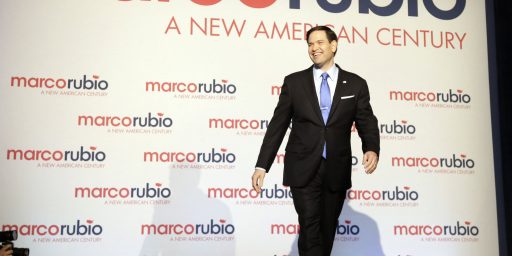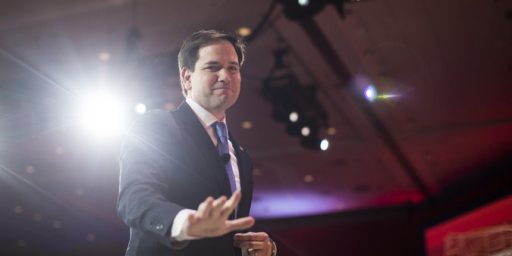Republican Response To Obama Immigration Moves Not Entirely Negative
Republican reaction to the President's immigration policy announcement has been relatively muted, and it's likely to stay that way.
Perhaps the most interesting thing about the change in immigration policy announced by President Obama yesterday is the fact that the response from leading Republicans has not been nearly as negative as one might expect. Yes, there are some corners of the conservative world where it’s being denounced, but the complaints are coming from what you might call the usual suspects. Rush Limbaugh called the plan ”Catch. Release. And Vote,” a rather obvious implication that this was all part of a plan to create new voters for the Democratic Party. Congressman Steve King said last night that he’s considering suing to stop the policy from being implemented. Senator Lindsay Graham called the decision “possibly illegal.” And, of course there was the usual cast in the conservative blogosphere ready at the keyboards to denounce the decision as the latest example of “tyranny” from the Obama Administration.
For the most part, though, the response from leading Republican politicians has been far less confrontational, some might even say conciliatory at least on the general policy arguments behind the decision Obama made if not the manner in which he is implemented it. Take, for example, the comments that Senator Marco Rubio, who has been quietly working behind the scenes in the Senate to put together a version of the DREAM Act that the could get bipartisan support, made after the policy change was announced:
A GOP senator on the short list to be Mitt Romney’s running mate is applauding President Obama’s move to forego deportations for some illegal immigrants.
Sen. Marco Rubio (R-Fla.) said the more lenient policy is “welcome news” for those immigrants who will benefit, though he was quick to knock the administration for acting unilaterally.
“Today’s announcement will be welcome news for many of these kids desperate for an answer, but it is a short term answer to a long term problem,” the Cuban-American Rubio said in a statement. “And by once again ignoring the Constitution and going around Congress, this short term policy will make it harder to find a balanced and responsible long term one.”
Meanwhile, Mitt Romney, who was at the beginning of a bus tour that started yesterday, stayed relatively silent about the issue for the better part of the day yesterday and when he did comment, his comments mirrored those of Senator Rubio, and also signaled something of a shift in emphasis on the entire issue of immigration that appears to be due to Rubio’s influence:
MILFORD, N.H. — At a campaign stop here Friday, Mitt Romney criticized President Obama’s new immigration policy, calling it a short-term fix — and signaling support, for the first time, for legislation that would allow some illegal immigrants to stay in the country.
“I believe the status of young people who come here through no fault of their own is an important matter to be considered and should be solved on a long-term basis so they know what their future would be in this country,” Romney said.
He continued: “I think the actions that the president took today make it more difficult to reach that kind of long term solution because an executive order, of course, is a short-term matter that can be reversed by subsequent presidents.”
He didn’t go into detail as to what that legislation would include, but he did nod to the efforts of rising Republican star and Florida Senator Marco Rubio, who has supported giving renewable visas to young immigrants who go to college or join the military, and who came to the U.S. at a young age at the behest of their guardians.
“I’d like to see legislation that deals with this issue,” Romney said. “And I happen to agree with Marco Rubio, as he said this is an important matter, we have to find a long-term solution.”
He did not respond to questions shouted to him by the press corps about whether he would reverse Obama’s decision. But the support for Rubio’s efforts marks a sharp change in rhetoric on Romney’s part. While he has expressed opposition to the DREAM Act as it was written, he has said he would “consider” Rubio’s proposal.
The most significant thing here, of course, is that Romney specifically didn’t say that he would repeal the policies that the Obama Administration enacted today and, like Rubio, instead focused on the idea that they need to be put in the form of legislation so that the rights granted would be permanent rather than something that is going to be last two years, would have to be re-applied for after that point, and would always be subject to being repealed or modified by whoever happened to be in the White House at a given time. In fact, I think that Allahpundit gets it mostly right when he argues that Romney is unlikely to repeal these policies if he becomes President. The Republican Party already has enough problems with the Latino demographic as it is, an action like that would only be guaranteed to send more of them in to the arms of the Democrats. Instead, what we’re likely to see from a President Romney would be a push for a new Dream Act, perhaps not as far reaching as the one that has been proposed to Congress but broad enough that it addresses the problem of people who have been in the country since they were young, have not committed any serious crimes, and have contributed to their adopted country. Some of you may object and point to the GOP resistance on immigration reform that has been a reality since 2006 or so, but this reform effort would have something that previous efforts have not, the backing of someone who is highly regarded by the GOP base, in the person of Marco Rubio and the growing recognition among Republican leadership that intransigence on immigration is a long-term loser for the party.
Whatever might happen should Romney win the election, though, you can count on one thing. You aren’t going to hear very many negative denunciations of the merits of the policy change from Republican politicians.







Stated another way, Team Romney wasn’t dumb enough to take the bait.
Regarding the larger issue of immigration reform, it’s beyond obvious — outside the ignorant and irrational fever swamps of talk radio and certain corners of the Internet — that we need some type of guest worker program. We also could use some major reforms to the work visa programs, along with a lot of reforms to the immigration court system. Romney’s no dummy. If he manages to win the presidency his immigration reform package probably will look a lot like W. Bush’s plan from 2006, which included a guest worker program. It also probably will include elements of Rubio’s plan.
As I noted late last night, given that G.H.W. Bush issued a similiar executive order ( 12711 – http://en.wikipedia.org/wiki/Executive_Order_12711 ) in 1990 which sets a precedent for Obama’s order.
In the case of Bush I, the order essentially delayed deporting any Chinese Citizens whose visas ran out (or were otherwise in the country illegally) until 1994. It demonstrates that a President is able to (a) temporarily delay the enforcement of certain actions for (b) a specific subgroup.
This executive order has been used as precedent in a number of federal appeals.
That said, the Legislative Btanch could change the law, but I don’t see that as anything that can happen fast.
Not dumb enough to take the bait yet. A Romney position is always built on a foundation of Jello-O. Let’s see which way Roger Ailes and Rush Limbaugh tell him to jump. Then judge.
@michael reynolds: That will really be what to watch. Romney still stands on a shaky foundation with the base. If popular republican/conservative/tea party opinion turns against this, then Romney will truly face a test.
And given the fact that he’s traveling around small town America for the next few days — often the location of some of the strongest anti-immigrant feelings (as with certain manufacturing communities). That could make it tough on Romney to both balance energizing base and keeping a metered response in the press.
“A Romney position is always built on a foundation of Jello-O” just as any Obama position is always built on the foundation of claiming to “evolve.”
@paladin:” A Romney position is always built on a foundation of Jello-O” just as any Obama position is always built on the foundation of claiming to “evolve”
I’m a little confused. Is Obama a vicious dictator viciously cramming Socialism, Shariah and Communism down our throats, or is he a limp noodle who only does what he thinks the polls will support. Can you remind me which one you want him to be today? Or maybe explain how he’s both at once?
Translation: the primaries are over, the Republicans are now trying to win the general election
I am not surprised by the relatively mild, restrained response of republicans to Obama’s EO yesterday. I think the biggest backlash from republicans will be the manner in which this new policy was created — without any Congressional collaboration. Like one poster described it: “It was a right move done in a wrong way. for the wrong reasons”
Barak Obama has had 3 1/2 years to create some kind of legitimate, long-term joint immigration policy. However, unlike George Bush, and other republican leaders, there has been no attempt (other than the DREAM Act) to address this issue. When you look back on the history of immigration reform, it has largely been worked on by republicans, in their very public attempts to formulate a standing policy for the illegal immigrant population residing here. The CIR Act of 2007 proved to be the most public and contentious legislation, which followed on the heels of three other immigration-related bills that went no where. People, from both sides of the aisle, gave various kinds of support and input to these attempts —>like, Kennedy, Feinstein, DeMint, Lindsey Graham, Jon Kyl, John McCain. George Bush promoted the CIR bill, receiving a lot of grief from the party’s more conservative contingency. But, that is what stronger President’s do — they give pieces of legislation they believe in their best shot, and then accept the responsibility of failure when it doesn’t fly, rather than passing the blame on to someone else — a tact generously used by the current president, and very evident in his Ohio speech last Thursday.
Ironically, even though it is the democrats who have taken the least action on immigration reform, they are the ones now anointing themselves as the party who is the most sympathetic and sincere for immigration reform. It reminds me of the political path the Civil Rights Act of ’64 took, where a republican senator, by the name of Everett Dirksen, led the fight for civil rights legislation to successfully be passed. In fact, a larger percentage of republicans sitting in congress at that time, ended up voting for it than the percentage of democratic congress people, and yet the democrats managed to get top billing, and assumed the mantle of being the party that ushered in civil rights. Do you think Lyndon Johnson would have pulled this off without Everett Dirksen and the enormous republican support behind it?
Republicans do thoughtfully deal with social issues, but with less pomp, ceremony, and back-slapping themselves. They leave that to the democrats, and unfortunately, much like Hollywood events, this is what grabs the public’s attention, and oftentimes takes all the glory.
One point that needs to be clarified here.
This was NOT an Executive Order, but an change in policy announced by the DHS, of which ICE is a division
@Doug Mataconis:
Thanks for the clarification. It’s been described as a ‘presidential order’ in press releases, which gave reason to believe it was an EO.
In other words, “ask me tomorrow, I’ll probably think differently.”
John Yoo presents an interesting precedent-setting scenario this most recent example of executive overreach might induce in future administrations:
@mattb: In the case of Bush I, the order essentially delayed deporting any Chinese Citizens whose visas ran out (or were otherwise in the country illegally) until 1994. It demonstrates that a President is able to (a) temporarily delay the enforcement of certain actions for (b) a specific subgroup.
There’s a single phrase missing from your comment here, a single highly relevant fact that makes that particular Executive Order so unique:
Tiennamen Square.
That order applied to Chinese who might want to seek political asylum from a very brutal crackdown on dissent. It was very narrowly targeted.
This policy of Obama’s has no similar triggering event, and is nowhere near as narrowly focused.
But it’s an interesting precedent Obama is setting here — he, essentially, sent his proposal to Congress with this unspoken rider: “This is what I want. Approve it, or I’ll just do it anyway without you.”
I find myself intensely curious what sorts of actions President Romney might take, with that particular precedent clearly established. Obama’s already trashed that annoying “War Powers Act,” so he’s free there, too…
It is the height of audacity for Yoo, a man who brazenly manipulated legal arguments to give President Bush unprecedented and unconstitutional authority to run a secret war, to complain about “executive overreach.”
Also, his argument is largely nonsense
@al-Ameda:
“ask me tomorrow, I’ll probably think differently.”
It’s called evolving thoughts, which has been sanctioned and exhalted by the left. You can’t have it both ways — defining changing one’s mind as ‘evolved’ on one side of the political fence, while deriding the other side and saying it’s flip-flopping.
@jan: Jon Yoo is the very LAST person who should bring up a discussion of executive overreach.
Don’t forget the Bradley effect. The polling data probably underestimates the challenge Romney faces in getting his own base out in Nov. No I have no way to prove this before Nov.
Yeah how about posting in the right thread, rudderbrains
@jan: Odd. When John Yoo worked for the Bush administration, he was a great proponent of unlimited powers for the president. Wonder why that’s changed. Wonder why Jan doesn’t wonder.
@jan:
That was in a Republican Party a long, long time ago, and far, far away.
Get serious. Ev Dirksen and those like him would have snowball’s chance in hell of being elected to office in today’s Rebooblican Party.
I wonder about this too. One day the right tells us Obama is a 90 pound weakling endlessly getting sand kicked in his face, the next he is a demigod reshaping America into a socialist hell as if the country was so much putty in his hands.
@Doug Mataconis:
Got it. But wouldn’t that Bush Executive order still suggest that it was within the power of the executive branch to make such a policy change? Or (conversely) does it suggest that there might need to be an explicit Executive Order?
Either way, it looks like — contra Lindsay Graham and others — that this is entirely legal (or at least not without precedent.
@Jenos Idanian #13:
Working backwards, I would argue that this is equally targeted — just rather than going by ethnic group, the current order goes by age — but we can disagree on targeting.
As for the idea of a “triggering event”, I don’t see why that matters from a purely legal point of view. Either the branch/position has the power to do this or it does not. Any related events (with the exception of being at War or a few other possibile special cases) should have no effect on that ability to act. And I don’t see how Tiennamen Square represented a special event that would have granted the President any additional powers.
Now, beyond “can” he do it, the question is “should” he do it. And that is where your question in more relevant Jenos. I’ve already stated my feelings on that on the other thread.
@mattb:
I didn’t say it was illegal
@jan: Side note tied into our conversation from another thread. This is an example of a good link, and while not a “fact” per sea (it can’t tell us whether or not this action is legal or overreach) it does present an argument. Thanks for sharing it and citing the author.
It also then allows us to have a discussion about the credibility of the source and the reasoning. Others have already explained why it’s problematic turn to John Yoo for your argument (given his personal history and his own partisan efforts in extending presidential power).
So while you may consider him a good argument source, I hope you can at least see (if not agree with) why we see him not the strongest individual to use to bolster your case. If you could find a more neutral legal scholar (or even a conservative one who is better respected across the boards, i.e. someone from Volhk), you’d have a much stronger case.
@Doug Mataconis:
I didn’t suggest you did. Sorry if it read that way, it wasn’t my intent. Plus I’m just working on understanding how to talk about this… so that was my intent in asking that question of you.
No, I knew that unless something changed you thought it was most likely legal. In fact, I think you were first people yesterday to explain why it was most likely legal on the other thread.
But there were still a number of people, including Dr Joyner who were not sure about the legality. So I thought looking at that Executive Order might shed some light on it.
Also I was reacting to the quotes from Stunning Steve King and Lindsay Graham (I think Peter ‘Have you ever been a Muslim’ King was also on the it’s illegal/impeachable bandwagon).
Plus I thought it would be good just to get that info out.
The Republicans in Congress have no interest in collaborating with this President. I am not really interested in crocodile tears about how Mean Mr. Obama has cut them out of the process. They cut themselves out of the process long ago when they placed ideological purity above country.
Anjin,
The fact that the President cannot get Congress to do something is insufficient justification for him to amass more power in the hands of the Imperial Presidency.
@jan: Please explain to us why the south was predominately Democratic before passage of the civil rights act and is now mostly Republican.
@Doug Mataconis: Thanks for that excellent post on the legality of this. It really helped me understand things.
@jan:
While somewhat true, the entire “larger percentage of republcans voted for civil rights” breaks down a bit when you look at the actual numbers, broken down by party and region:
The original House version:
Southern Democrats: 7–87 (7–93%)
Southern Republicans: 0–10 (0–100%)
Northern Democrats: 145–9 (94–6%)
Northern Republicans: 138–24 (85–15%)
The Senate version:
Southern Democrats: 1–20 (5–95%)
Southern Republicans: 0–1 (0–100%)
Northern Democrats: 45–1 (98–2%)
Northern Republicans: 27–5 (84–16%)
In the North, Democrats voted for the measure at a higher rater than Republicans (nearly 10% in both cases). In the South note that 100% of Republicans (albeit only 11 in total between the two bodies) voted against it. Now granted, a lot, though not all, Southern Democrats voted against it.
But as many have pointed out, most of those Southern Dems broke from the Democratic Party and then moved over to the Republicans. And since the civil rights bill the south has typically elected Republicans (and been consistently Red in most Presidential elections).
There’s no question that Republicans did play positive rolls in the Civil Rights movement. But to pretend the “Republicans” were and still are the party of Civil Rights or that the Dems some how didn’t vote for Civil Rights is a pretty ballsy take on things!
{source: http://en.wikipedia.org/wiki/Civil_Rights_Act_of_1964#By_party_and_region )
Two questions:
A. Was what he did legal?
B. Did we elect him to be the nation’s executive?
Bonus question:
Do you feel you properly understand how executive leadership works?
The cheap labor Republicans will always support open borders and unlimited immigration because they are short sighted. Any money saved on unskilled labor is lost in higher taxes, higher housing costs, higher insurance costs, and private school tuition bills.
What is amazing is that the Republicans are being short sighted in the belief that adding millions of poor third world immigrants to the voting rolls and to the population of the U.S. will help anyone other than the patron class.
Citing Jon Yoo. Is there anyone in America less credible? You cannot make this stuff up.
@jan:
John Kerry was thought to be, and was ruthlessly characterized as, a flip/flopper. And now conservatives are getting defensive because Romney repudiates or disowns his own statements, sometimes a day later? Seems to me that you guys are the one with the ‘phoniness’ problem this time around.
Liberals got away with nothing when it came to John Kerry, And now you’re trying to cop a plea with Romney – “evolving”? Please, Romney is as inauthentic a major politician as I’ve seen the last 25 years – he believes in nothing.
@jan:
You seem to want Obama to “do things” by “convincing congress” when they don’t want to be, and then of course we judge the president by the things congress would not do, or did badly.
It’s a flaw in our human nature, if you ask me.
We are so “leader oriented” that we can’t really track responsibility. It might be our fantasy that a persuasive president convinces congress to do the right thing … but is that his job? Aren’t congressmen supposed to be holding up their end, in the legislative branch?
We don’t expect the president to persuade the other branch, the supreme court, for instance, do we?
(We all hold Congress in low regard, but we don’t hold them in high enough responsibility.)
Put yet another way, we are talking about immigration as an executive branch decision, only because Congress has defaulted on its responsibility.
Other threads, moving to 60 vote majorities, and cloture rules, are more properly focused.
The Tsar got it in one:
@jan: “Barak Obama has had 3 1/2 years to create some kind of legitimate, long-term joint immigration policy. However, unlike George Bush, and other republican leaders, there has been no attempt (other than the DREAM Act) to address this issue. ”
And 3 1/2 years with the GOP working 100% in opposition, to the point of opposing their own proposals if President Obama supported them.
“It reminds me of the political path the Civil Rights Act of ’64 took, where a republican senator, by the name of Everett Dirksen, led the fight for civil rights legislation to successfully be passed. In fact, a larger percentage of republicans sitting in congress at that time, ended up voting for it than the percentage of democratic congress people, and yet the democrats managed to get top billing, and assumed the mantle of being the party that ushered in civil rights. ”
This was before the GOP became the party of the Confederacy.
In fact, this was the big breaking point – in 1964, the Republican Goldwater swept the states of the Confederacy, the first time ever that a GOP candidate for president did that.
@jan:
Yoo: “So what we have here is a president who is refusing to carry out federal law simply because he disagrees with Congress’s policy choices. That is an exercise of executive power that even the most stalwart defenders of an energetic executive — not to mention the Framers — cannot support.”
Yoo claimed that Clinton exceeded his presidential powers.
Yoo claimed that Bush could never exceed his presidential powers, because they were without limit.
Yoo claimed that Obama exceeded his presidential powers.
@mattb: “Also I was reacting to the quotes from Stunning Steve King and Lindsay Graham (I think Peter ‘Have you ever been a Muslim’ King was also on the it’s illegal/impeachable bandwagon).”
Please note that Graham is a guy who slavishly served Bush/Cheney in their quest for power.
And IIRC, he was cheering the NDA for the ability to imprison US citizens without trial.
@Tsar Nicholas: “Romney’s no dummy. If he manages to win the presidency his immigration reform package probably will look a lot like W. Bush’s plan from 2006, which included a guest worker program. It also probably will include elements of Rubio’s plan. ”
No, it won’t. The Tea Party has spoken, and it’s just too good a piece of red meat not to throw to them while the money boys loot their last dimes.
Doug: “In fact, I think that Allahpundit gets it mostly right when he argues that Romney is unlikely to repeal these policies if he becomes President. The Republican Party already has enough problems with the Latino demographic as it is, an action like that would only be guaranteed to send more of them in to the arms of the Democrats. ”
That didn’t stop them from doing what they did in ’08 to the present. The base doesn’t give a f*ck about pissing off Latinos, and in fact enjoys it. The elites didn’t do anything to moderate this.
@Doug Mataconis: “It is the height of audacity for Yoo, a man who brazenly manipulated legal arguments to give President Bush unprecedented and unconstitutional authority to run a secret war, to complain about “executive overreach.”
Also, his argument is largely nonsense ”
The man is an impressive and totally shameless hack, isn’t he?
@Jenos Idanian #13: “It is the height of audacity for Yoo, a man who brazenly manipulated legal arguments to give President Bush unprecedented and unconstitutional authority to run a secret war, to complain about “executive overreach.”
Also, his argument is largely nonsense ”
And that has what legal implication, since the US government has no problem deporting people back to nasty regimes – if the US government likes those regimes?
[note: I agreed with the order; I’m asking what legal justification was there]
@Doug Mataconis: “The fact that the President cannot get Congress to do something is insufficient justification for him to amass more power in the hands of the Imperial Presidency. ”
True, but it is an excellent argument against those people who (quite dishonestly) rail against President Obama for not working with Congress.
I’ve seen Rubio say that this should have been done through the DREAM bill or a similar bill, without mentioning that the GOP crushed the DREAM bill.